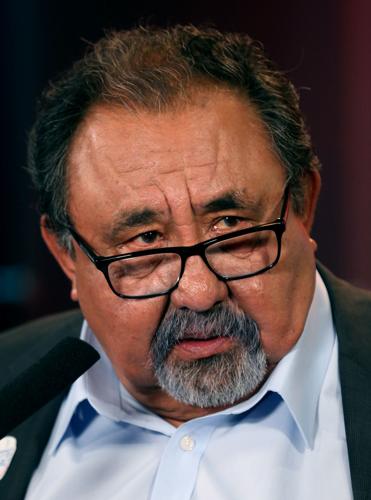U.S. Rep. Raúl Grijalva says he will expand his committee’s probe of the Rosemont Mine’s federal approvals, due to new revelations that a former Coronado National Forest chief was stymied in her efforts to raise legal and environmental concerns about the mine.
Grijalva, a Tucson Democrat and a longtime opponent of the mine, is chairman of the House Natural Resources Committee.
Retired Coronado forest supervisor Jeanine Derby told the Arizona Daily Star in an interview this month that she tried unsuccessfully a decade ago to raise the same legal issue about the mine that a federal judge used last month to stop all work on the $1.9 billion project.
“I think that for me and certainly for the committee, this further escalates the need for us to do some oversight, to talk to all parties involved,” including Derby, Grijalva said in an interview after the Star published Derby’s comments last Sunday.
“This now is becoming a situation where information, studies, opinions that should have been part and parcel of any discussion early on were not included,” the congressman said.
Derby told the Star she tried unsuccessfully to raise with her superiors the question of whether Rosemont had legally valid mining claims to federal land where it plans to dispose of waste rock and mine tailings.
She said her boss, then-Southwestern regional forester Corbin Newman, had Derby and a top aide flown from Tucson to Albuquerque for a session in which she was told to pipe down about the issue.
Newman acknowledged he urged Derby and her aide to “move on” from the issues she was raising, and get started on preparing a Rosemont environmental impact statement.
He said their concerns conflicted with national Forest Service policy that the agency can’t say “no” to a mine except under extreme circumstances and that in most cases, mine waste rock and tailings could be disposed of on public land.
But he denied ordering Derby to stay silent.
In his ruling last month, U.S. District Judge James Soto wrote that Hudbay Minerals Inc., which would build the mine, couldn’t use federal land for dumping waste rock and tailings because the company hadn’t shown that those lands contained economically valuable minerals. That’s a legal requirement for showing that its mining claims are valid.
Hudbay has since said it will appeal the decision.
In a statement released late Friday afternoon, a Forest Service spokeswoman said, “The Forest Service does not discuss pending litigation. However, the agency values its relationship with the Arizona congressional delegation and has a process to be responsive to the needs of Congress.”
Grijalva said he was “absolutely surprised” reading Derby’s comments because it has seemed until now that the Forest Service had a monolithic stance on the mine.
“Its entire staff appeared to be on board with the idea that it couldn’t say ‘no’ to a mine on its land,” he said.
His committee is already investigating the U.S. Army Corps of Engineers’ approval last March of a Clean Water Act permit for the mine.
Rosemont would directly create about 500 high-paying jobs and far more jobs indirectly. But its construction would disturb about 5,430 acres of federal, state and private land in the Santa Rita Mountains about 30 miles southeast of Tucson.
“All this relevant information needs to be out. This court decision would have potentially been unnecessary, given the opinions originally produced. This situation is not overnight. It’s been going on for a decade plus,” Grijalva said.
With the Forest Service, a concern like Derby’s “goes up the ladder and stays there. This should have been part and parcel of what people talk about,” Grijalva said. “Federal land is the nexus for this thing to work. Without it, there is no mine.”
Kerwin Dewberry, the current Coronado National Forest supervisor, didn’t return a phone call from the Star seeking comment on Grijalva’s investigation plan.
Newman, now retired and living in Oracle, told the Star in an email that he would cooperate with the House committee’s investigation but has no opinion about it.
“Congress will do what it will do. The process will play out in both political and legal arenas and the rest of us will be spectators,” he said.
Since the mining claim-waste disposal issue was publicly discussed at length a decade ago, he’s not sure if Rosemont’s fate would have turned out differently, if the internal Forest Service disputes had been disclosed then, he added.
Derby, now retired and living in the Tucson Mountains foothills, said she was glad that Grijalva is investigating because it will be “good in the long run for the health of the agency, government agencies in general and also the government’s responsibility to the public.”
While it’s unknown if Grijalva’s investigation could affect the mine dispute’s outcome, she said she thinks it could affect future prospects for overhauling the 1872 Mining Law, which was passed to encourage mining on public lands.
Several law professors who agree with Soto’s ruling have already said that, if it survives appeals, it could trigger changes in that law because the ruling may make it hard to approve new mines under existing law.
“If that happens, it would be good, even if it’s incremental,” Derby said of changes to the mining law.







